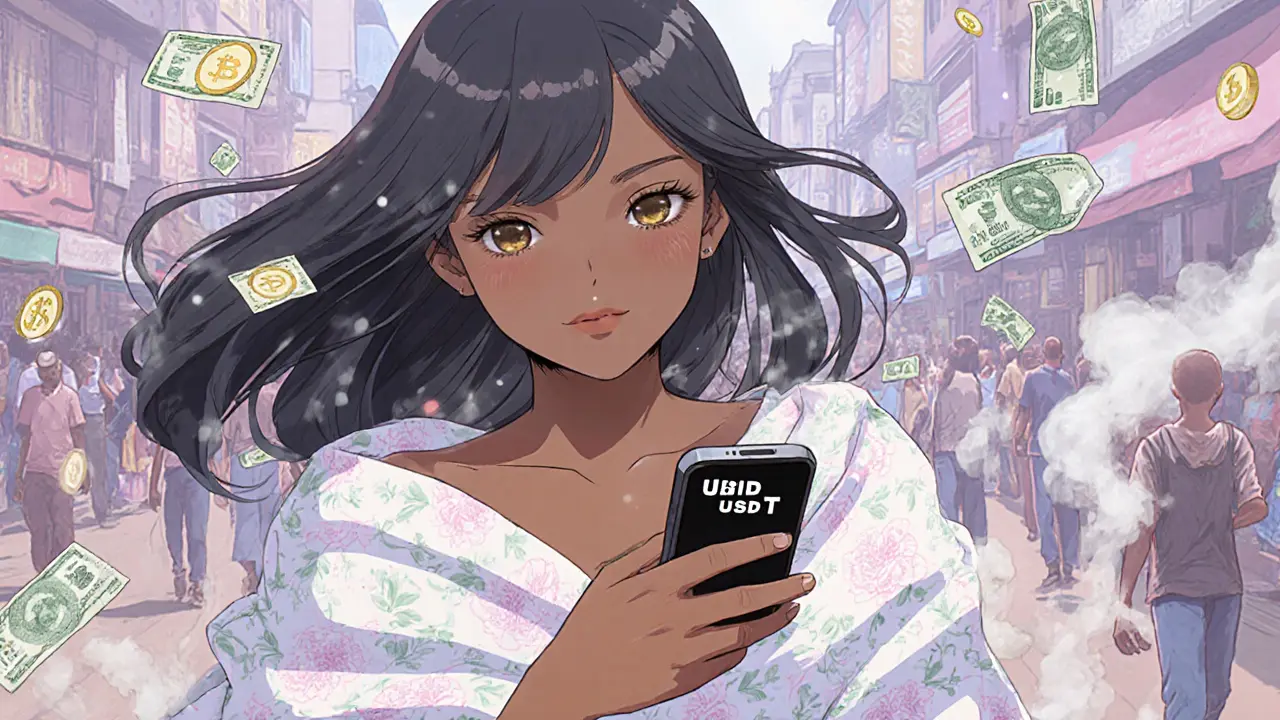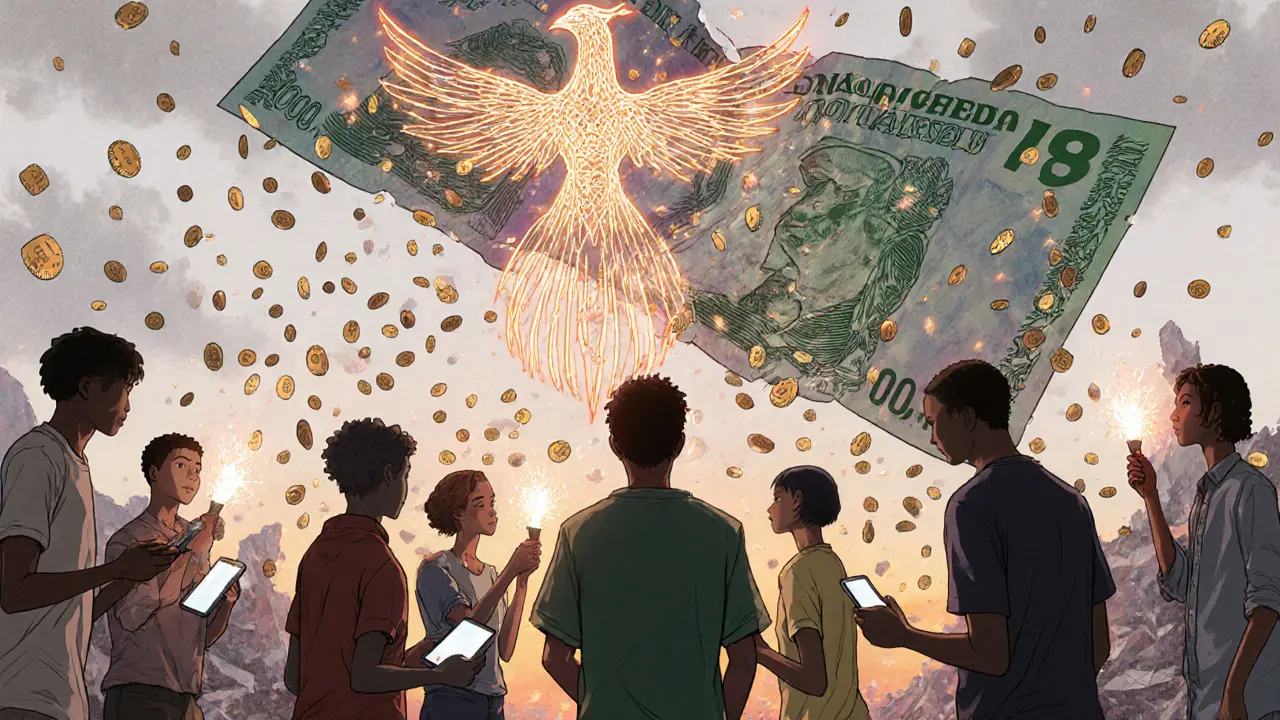How Crypto Trading Is Undermining the Nigerian Naira
 Oct, 29 2025
Oct, 29 2025
Naira Value Decay Calculator
Current Value in USDT
Equivalent to ₦
Value Decay Analysis
2024 Data Nigeria processed $59 billion in crypto transactions. 85% of transactions were under $1 million. 43% of small transactions used USDT.
By 2025, over 22 million Nigerians-more than 1 in 10 people-own cryptocurrency. Not because they’re chasing get-rich-quick schemes, but because the naira no longer works for them. Inflation hit 24% in 2023. The naira has lost over 75% of its value against the dollar since 2016. People aren’t buying Bitcoin to gamble-they’re buying it to eat, pay bills, and send money home. And every time they do, the naira gets weaker.
Why Nigerians Turn to Crypto Instead of Banks
The Central Bank of Nigeria (CBN) controls the official exchange rate. But the real rate-the one people use on the street-is often double or triple that. That gap isn’t a glitch. It’s a feature of a broken system. When the government says $1 = ₦730, but you need to pay ₦1,500 on the black market to get it, people stop trusting the official system. They look elsewhere. That’s where crypto comes in. USDT, a stablecoin pegged to the US dollar, is the most traded asset in Nigeria. It’s not because people love blockchain tech. It’s because USDT holds its value. You can buy it with naira, send it to a relative in the UK or the US, and they cash it out in dollars-no bank approvals, no 8% fees, no waiting weeks. A 2024 report showed Nigeria processed $59 billion in crypto transactions in just one year. That’s more than any country except India. And it’s not just the wealthy. Eighty-five percent of these transactions are under $1 million. Most are small, daily transfers-money from a son working in London to his mother in Lagos. Money that used to flow through Western Union or bank wires now flows through wallets. And that means less demand for naira. Less demand means lower value. Simple math.The CBN’s Failed Crackdown
The Central Bank didn’t sit back. In 2017, they told banks to cut off crypto users. Accounts got frozen. Traders were scared. But it didn’t stop anything. People just moved to peer-to-peer platforms like Paxful and Binance P2P. They paid cash in markets. They used mobile airtime to trade. They found ways. In 2022, the CBN fined six major banks ₦1.31 billion for even *talking* to crypto clients. That didn’t scare people-it showed how desperate the bank was. The fines didn’t reduce crypto use. They just made banks more paranoid and less helpful to ordinary Nigerians. Then came the End SARS protests in 2020. When the government froze bank accounts of activists, people turned to Bitcoin as a way to receive donations without government interference. Bitcoin trended on Twitter for days. That wasn’t about politics. It was about survival. If your bank won’t let you move money, you find another system.
Why Crypto Isn’t Just a Fad
About 36% of Nigerian adults are unbanked. Another 30% are underbanked-meaning they have an account but can’t access loans, international payments, or even consistent ATM service. In rural areas, you might walk 20 kilometers to find a bank branch. But you can get a smartphone. And with a smartphone, you can access crypto. The average Nigerian under 30 has grown up with mobile money, WhatsApp, and TikTok. They don’t need a branch. They don’t need paperwork. They need speed and reliability. Crypto delivers that. In 2025, 35% of all Nigerian adults have invested in crypto. Half of them are under 30. That’s not a trend. That’s a generational shift. The numbers don’t lie. Crypto transaction inflows dropped slightly from $47 billion in 2021 to $44.3 billion in 2023. But in 2024, they jumped to $55.4 billion-a 25% surge. That’s not a recovery. That’s acceleration. People aren’t giving up. They’re doubling down.The New Law That Changed Everything
In early 2025, Nigeria passed the Nigerian Investment and Securities Act. For the first time, digital assets were officially recognized as securities. That didn’t legalize crypto. It regulated it. The government stopped pretending it could ban it. Instead, it started trying to control it. This shift matters. Before, crypto was illegal. Now, it’s a financial instrument. That means exchanges can apply for licenses. Wallet providers can operate legally. Investors get some protection. It doesn’t mean the CBN loves crypto. It means they realized they lost the war. The law doesn’t fix the naira. But it acknowledges the truth: crypto isn’t the problem. The naira is.
What This Means for the Naira’s Future
The naira isn’t falling because of oil prices or corruption alone. It’s falling because people are walking away from it. Every time someone buys USDT instead of dollars at the official rate, they’re voting with their wallet. Every time a Nigerian diaspora member sends $100 via crypto instead of Western Union, the naira loses a little more demand. By 2026, over 28 million Nigerians will own crypto. That’s nearly 12% of the population. That’s more than the number of people who use formal banking services in some states. Crypto isn’t just an alternative-it’s becoming the default for millions. The CBN still prints naira. But it can’t make people trust it. No amount of fines, bans, or official statements will bring back confidence when inflation eats your salary and your savings vanish overnight. People aren’t choosing crypto because it’s cool. They’re choosing it because they have no other option. The pressure on the naira won’t stop. It will grow. As long as the official exchange rate stays fake, as long as banks remain inaccessible, and as long as remittance fees stay high, crypto will keep growing. And the naira will keep falling.What’s Next for Nigeria?
There’s no magic fix. Printing more naira won’t help. Raising interest rates won’t help. The only real solution is to fix the economy-control inflation, let the exchange rate float, rebuild trust in banks, and create real financial access for everyone. But that’s a long-term project. Crypto is the immediate response. It’s the emergency tool. And right now, it’s working better than the government’s policies. Nigeria’s story isn’t unique. Venezuela, Argentina, and Turkey have seen similar patterns. But Nigeria’s scale, youth population, and tech adoption make it the most extreme case. The world is watching. And the message is clear: when a currency fails, people will find a better one-even if it’s digital, decentralized, and outside the system. The naira isn’t dying because of crypto. Crypto is thriving because the naira is broken.Why is the Nigerian naira losing value so fast?
The naira is losing value because of high inflation (over 24% in 2023), artificial exchange rate controls by the Central Bank, and a lack of confidence in the economy. People are losing faith in the currency as a store of value, so they’re moving their money into assets like crypto and dollars that hold their worth better.
Is crypto trading legal in Nigeria?
Yes, but with regulation. The Central Bank banned banks from handling crypto in 2017, but in 2025, Nigeria passed the Investment and Securities Act, officially recognizing digital assets as securities. This means crypto exchanges and platforms can now apply for licenses. Trading itself is not illegal-it’s just no longer in the gray zone.
What role does USDT play in Nigeria’s crypto market?
USDT (Tether) is the most popular crypto in Nigeria because it’s pegged to the US dollar. With the naira losing value daily, Nigerians use USDT to protect their savings and send money abroad without converting to naira. About 43% of all small crypto transactions (under $1 million) are in USDT.
How much money is Nigeria making from crypto trading?
In 2024, Nigeria processed $59 billion in crypto transactions. For 2025, the market is projected to generate $2.4 billion in revenue from fees, exchanges, and services. This makes Nigeria the second-largest crypto market in the world by transaction volume, after India.
Why are young Nigerians driving crypto adoption?
Over 52% of Nigerian crypto users are under 30. They grew up with smartphones and digital payments. They don’t trust banks that freeze accounts or charge high fees. They see crypto as a faster, cheaper, and more reliable way to earn, save, and send money-especially when jobs are scarce and inflation eats their paychecks.
Can the Central Bank stop crypto trading in Nigeria?
No. The CBN tried banning banks from supporting crypto in 2017 and fined institutions in 2022. But crypto trading only grew. With over 22 million users and peer-to-peer platforms thriving, the government realized prohibition doesn’t work. Now, they’re shifting to regulation instead of crackdowns.
How does crypto affect Nigeria’s foreign exchange reserves?
Crypto reduces demand for official foreign currency. When people buy dollars through crypto instead of the Central Bank’s official rate, less foreign currency flows into the country’s reserves. This makes it harder for the government to stabilize the naira and increases pressure on the parallel market rate.
Is crypto helping or hurting Nigeria’s economy?
It’s both. It’s hurting the naira by reducing its demand and bypassing official channels. But it’s helping millions of Nigerians by giving them access to global finance, cheaper remittances, and a way to protect savings. For many, crypto isn’t an alternative-it’s the only option left.

Alisa Rosner
October 29, 2025 AT 23:40OMG this is so real!! 🤯 I know so many Nigerians who use USDT to send money home-it’s the only way their families can actually get paid without waiting weeks or paying 10% fees. The naira is just broken, and crypto isn’t the problem, it’s the fix. 💪🇺🇸🇳🇬
MICHELLE SANTOYO
October 30, 2025 AT 11:28Capitalism is just a religion and the naira is its fallen god. Crypto isn’t replacing currency-it’s revealing the lie that money has intrinsic value. The state’s fiat is a myth. We’re all just playing along until someone wakes up.
Lena Novikova
October 30, 2025 AT 23:56Stop acting like this is new. Every dictatorship tries to control money and fails. The CBN is just a bunch of bureaucrats scared of losing power. People aren’t dumb-they see the scam. USDT isn’t magic, it’s just not a lie. Get over it.
Olav Hans-Ols
October 31, 2025 AT 04:16This is actually one of the most hopeful stories I’ve read in a while. People finding a way to survive despite broken systems? That’s human ingenuity right there. The fact that a mom in Lagos can get $50 from her son in London in 5 minutes instead of 5 days? That’s progress. 🙌
Kevin Johnston
November 1, 2025 AT 01:12This is 🔥! Nigeria’s future is digital and it’s already here. Keep going, y’all! 💯
Dr. Monica Ellis-Blied
November 2, 2025 AT 02:13Let us be unequivocal: the collapse of institutional trust is the root cause here. The Central Bank’s failure to maintain monetary integrity, coupled with systemic corruption and exclusionary financial policy, has created a vacuum-and crypto, however imperfect, has filled it with functional utility. This is not a trend. It is a civilizational recalibration.
Herbert Ruiz
November 2, 2025 AT 13:23So what? You’re saying people use crypto because the naira is bad. Big deal. So what’s your solution? This article just complains.
Frech Patz
November 3, 2025 AT 16:24Is there any data on the percentage of crypto users who also have formal bank accounts? Or is this a case of substitution or complementarity?
Derajanique Mckinney
November 4, 2025 AT 18:32lol nigerians be usin crypto like its a game but the naira still got value right?? 😂
Rosanna Gulisano
November 6, 2025 AT 14:40People should just work harder and stop cheating the system with crypto. This is immoral.
Sheetal Tolambe
November 6, 2025 AT 17:24I love how this mirrors what’s happening in India too-people bypassing banks for digital wallets and crypto. It’s not about rebellion, it’s about access. When the system doesn’t serve you, you build your own path. 🙏
gurmukh bhambra
November 8, 2025 AT 12:14Wait… is this a CIA plot? Crypto is a Western tool to destabilize African economies. They want us dependent on dollars. The CBN was right to ban it. The West fears Africa’s independence.
Sunny Kashyap
November 9, 2025 AT 20:42Why do we need crypto? Nigeria has oil. We should be rich. This is just a sign of laziness. Stop copying foreigners.
james mason
November 9, 2025 AT 22:58How quaint. A developing nation uses decentralized finance to circumvent its own inept institutions. How... predictable. The irony is that these very people would be the first to complain about blockchain’s energy consumption if they had the bandwidth to care.
Anna Mitchell
November 10, 2025 AT 22:02I think this is beautiful. People creating their own safety nets when the system fails them. That’s resilience.
Pranav Shimpi
November 11, 2025 AT 02:52USDT volume is high but most users don’t understand private keys. They trust exchanges. That’s a huge risk. If Binance P2P goes down or gets shut down, thousands lose everything. This isn’t freedom-it’s fragile dependence. Also, typo in my last message: ‘exchamge’ not ‘exchange’
jummy santh
November 12, 2025 AT 10:32As a Nigerian, I can confirm: my aunt in Abuja receives money from my cousin in London via USDT every month. No bank, no form, no delay. She buys rice, pays school fees, fixes the generator. The CBN calls it ‘illegal’-but they don’t see her face when she smiles because her son’s money arrived. This isn’t rebellion. It’s love. And it’s not going away.
Henry Gómez Lascarro
November 13, 2025 AT 22:19Let’s be honest: this isn’t about financial inclusion. It’s about the failure of African governance. Nigeria has been a basket case for decades. Crypto isn’t the solution-it’s the symptom. And now you’re celebrating a symptom? That’s like praising a fever because it means your body is fighting infection. Meanwhile, the root cause-corruption, mismanagement, lack of rule of law-remains untouched. You’re not building a future. You’re just delaying the collapse with digital bandaids. And don’t get me started on the environmental cost of mining. You want to ‘save’ your naira by destroying the planet? Brilliant.
Will Barnwell
November 14, 2025 AT 04:1259 billion? Where’s the source? That number looks made up. Also, why is everyone ignoring the fact that most crypto transactions are wash trades? This article reads like a Binance ad.